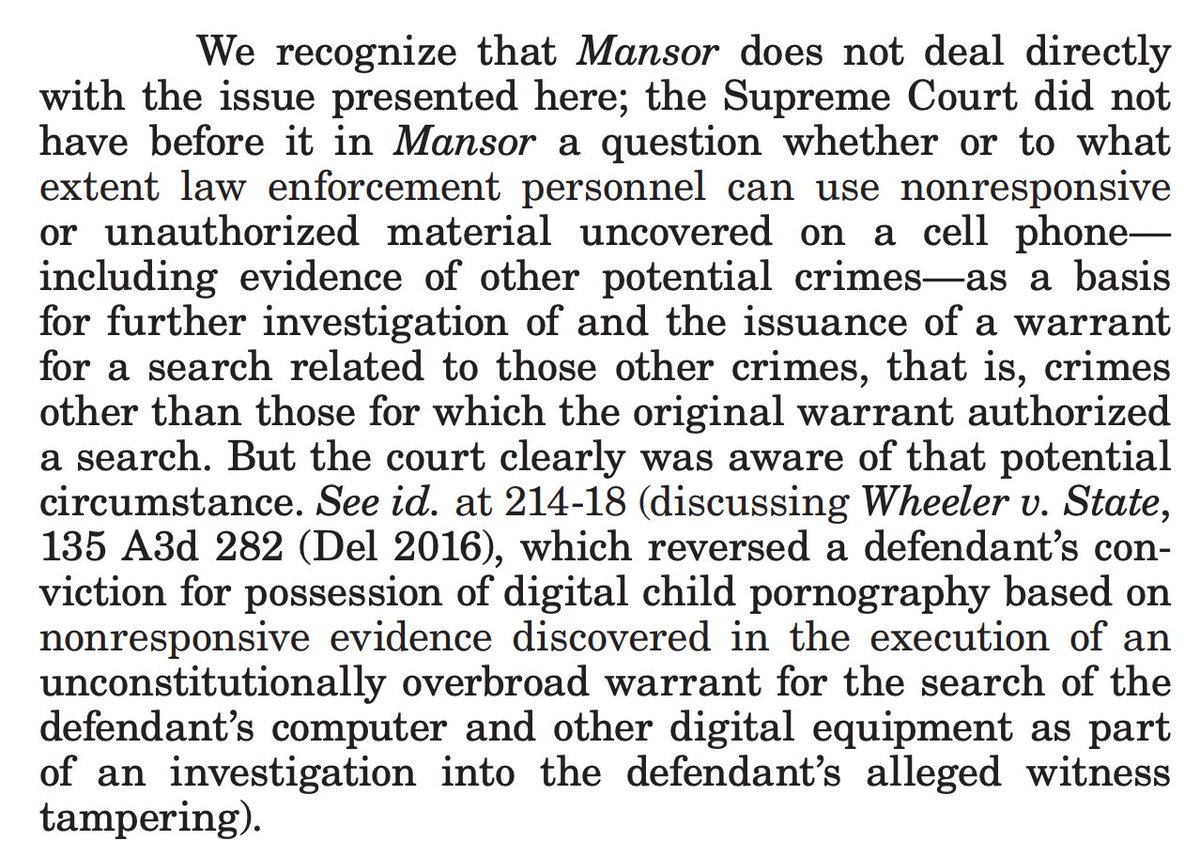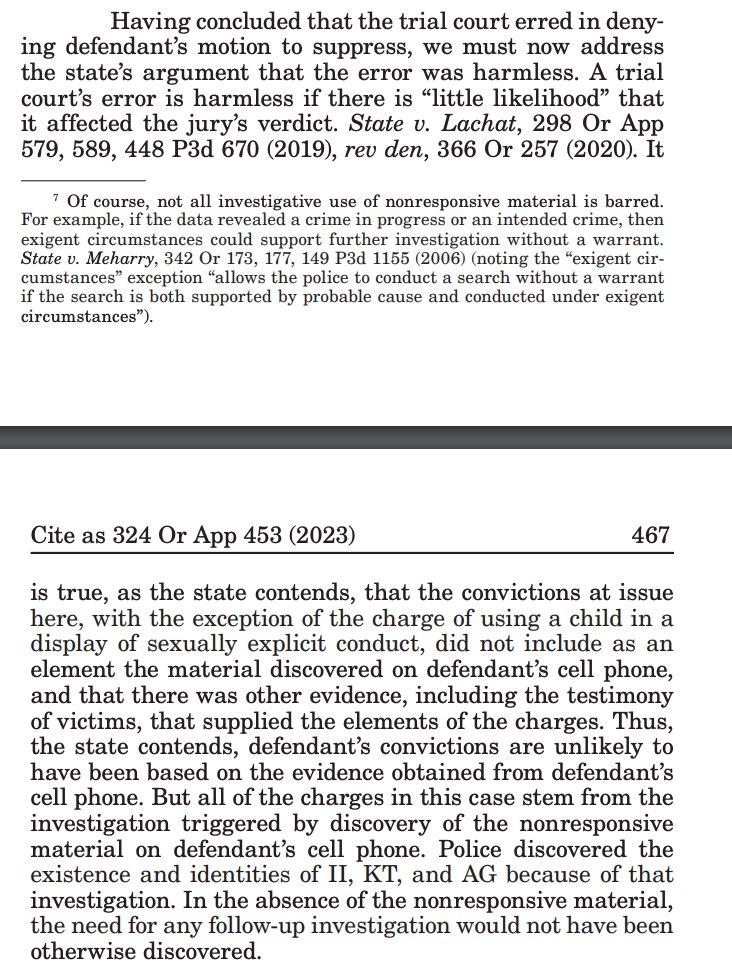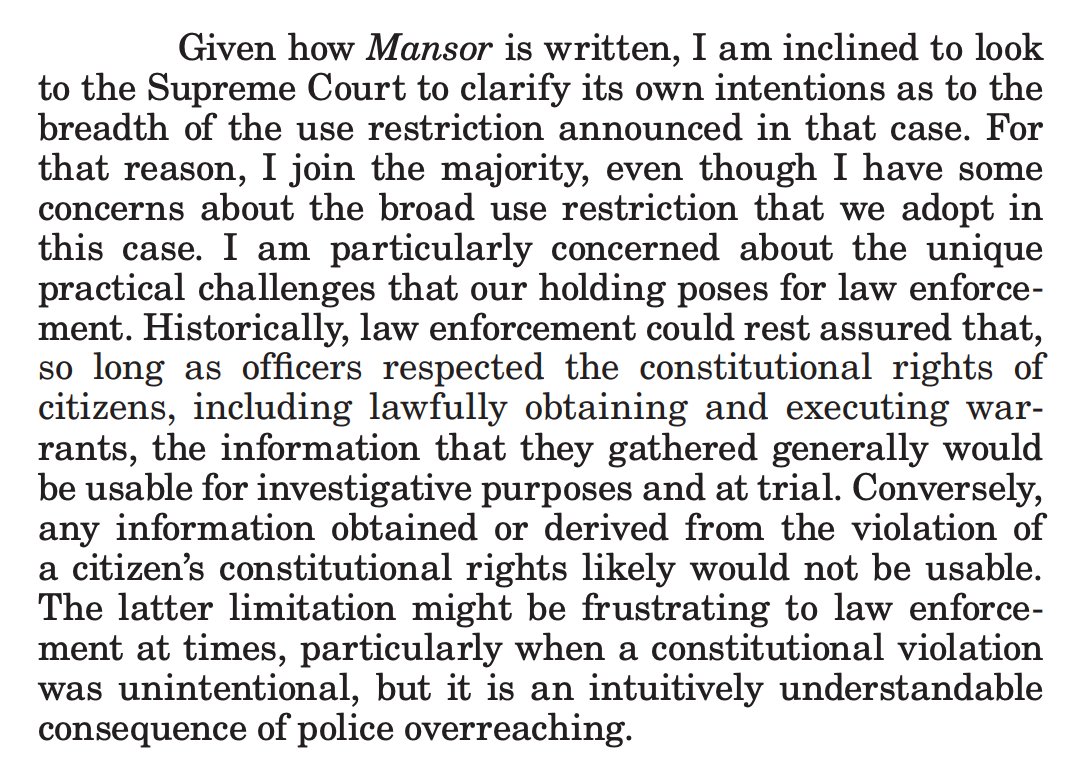
In 2018, the Oregon SCT adopted, under its state constitution, a proposal I made in a 2015 article on how to limit computer searches. Today the Oregon Ct of App addressed an important question of how to implement that proposal: What is use?
Thread. 🧵
cdm17027.contentdm.oclc.org/digital/collec… #N
Thread. 🧵
cdm17027.contentdm.oclc.org/digital/collec… #N

1st, some background. The general topic here is how should the law limit computer warrant searches. Computers store a vast sea of information. If you apply the physical-world rules, every computer search can be like a general warrant search in practice.
But how do you limit the searches? In my 2015 article, I argued that the best way was through use restrictions on non-responsive information. Allow the broad searches, but don't allow the stuff not described in the warrant to be used.
Article here: papers.ssrn.com/sol3/papers.cf…
Article here: papers.ssrn.com/sol3/papers.cf…

In 2018, the Oregon Supreme Court adopted that test under its state equivalent of the 4th Amendment in State v. Mansor, 421 P. 3d 323 (Or. 2018). scholar.google.com/scholar_case?c… 

The new decision, State v. Serrano, deals with an important question about how to implement the use restriction. The question: Can non-responsive info be used to start another investigation? cdm17027.contentdm.oclc.org/digital/search…
Unfortunately, the case deals with really horrible facts. The government obtained a warrant to search D's cell phone for evidence of sexual assault and revenge porn. But the warrant was very narrow: It only sought evidence of D's crimes as to a single victim, SB.
While searching the phone for evidence of D's crimes as to SB, the govt came across evidence D committed the same crime w/other victims. So the govt started to gather evidence as to the crimes against the other victims, and got a 2nd warrant to search the phone again for that.
The Ct of App makes two relevant holdings. 1st, the govt couldn't get the 2nd warrant. Given the narrow 1st warrant, the evidence of other crimes was outside that warrant, and thus non-responsive w/r/t it; it is forbidden "use" to use it to get PC for the 2nd warrant. 

Second, the court concludes that the government also couldn't use the nonresponsive evidence just to get leads as to the other crimes. That was a "use," too, under Mansor; the idea of restarting the investigaton is a use tainted by the 1st search. 

A few thoughts.
1st, I think that 1st holding is right. Use has to include using the evidence to get PC, or else the use restriction is just a formalism; the govt just needs to get a 2nd warrant and it can search as broadly as it wants. That's not enough privacy protection.
1st, I think that 1st holding is right. Use has to include using the evidence to get PC, or else the use restriction is just a formalism; the govt just needs to get a 2nd warrant and it can search as broadly as it wants. That's not enough privacy protection.
But I disagree on the 2nd holding. This is something that comes up a lot when I discuss use restrictions.
As the argument has evolved in my writing (explored in a draft chapter of my upcoming book), I don't think the use restriction should block new leads.
As the argument has evolved in my writing (explored in a draft chapter of my upcoming book), I don't think the use restriction should block new leads.
Under the approach I advocate in the draft chapter (not online, sorry), the right balance is to say the non responsive evidence *can* be used for leads. The government can't use the non-responsive evidence to get a warrant, but it doesn't need to avert its eyes.
Hard issue, but I've tended to think that strikes the needed balance. It allows broad searches ex ante; it removes the incentive to conduct pretextual general search through a use restriction ex post; but doesn't impose a total shield on new investigations.
Notably, Judge Aoyagi, concurring, says that the panel is trying to follow Mansor faithfully but that the Oregon Supreme Court will hopefully review this to say if Mansor is more nuanced than the appellate court thinks. I support that. 

One more thought: Part of the problem here is the narrowness of the 1st warrant. It seems to me that if the government has probable cause to think there is evidence of a crime on a cell phone, they should (and should be able to) get a warrant to search the phone....
...for evidence of D's crime as to all victims, not just one victim. Think of a drug case. If the government knows D received a shipment of cocaine in a green box today, the warrant will be to search thouse house for any cocaine. It won't just be to search for the green box.
If I'm right about how the particularity issue plays out, the government shouldn't have obtained such a narrow warrant the first time. They should have obtained a broader warrant that would have included all of the victims, making all of the evidence responsive and usable.
As always, stay tuned.
• • •
Missing some Tweet in this thread? You can try to
force a refresh




